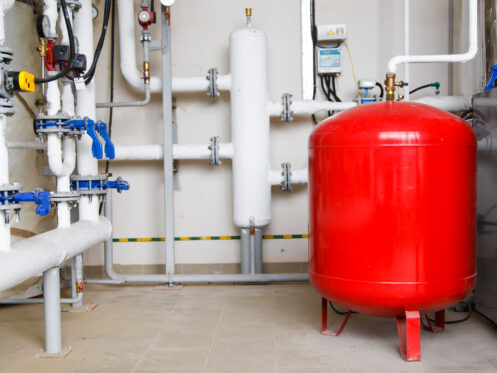Radiant heating is extremely effective and helps to maintain a more consistently warm and comfortable indoor environment compared to most other types of heating. One issue, though, is that the boiler that powers a radiant heating system can potentially be a safety hazard. That’s why it is important that you follow these tips to ensure your Frederick boiler always operates safely.
Get Your Boiler Inspected and Serviced Annually
The most essential step in ensuring any type of boiler operates safely is to have it professionally serviced and inspected every year. When servicing a boiler, a plumber will test to make sure that all of its safety mechanisms like the temperature regulator and pressure-relief valve are working correctly. They will also inspect the exhaust flue and test it to make sure that the exhaust fumes from the boiler are being vented outside as they should. This step is essential for ensuring that carbon monoxide can’t escape and leak out into the home.
Scheduling annual boiler service isn’t just important in terms of safety, but also for ensuring that the boiler is working efficiently and your radiant heating system is providing effective heat. If you neglect to get your boiler serviced yearly, it won’t work as efficiently and you may end up paying much more for heating. A poorly maintained boiler and radiant heating also won’t work as effectively as it should, which means your comfort will also start to suffer.
Keep the Area Around Your Boiler Clear
In most homes with radiant heating, the boiler is installed inside a utility closet that is also often used for storage. There’s definitely nothing wrong with this, but you do need to make sure that there are no items too close to the boiler. It’s especially important that you don’t have anything like a coat or any other items hanging on the boiler since this would create a major fire hazard.
Generally speaking, you want to make sure that there is at least two feet of clearance all the way around the boiler. Having sufficient clearance isn’t just important for preventing fire hazards, but also for ensuring that the boiler receives proper airflow. If the boiler isn’t properly ventilated and doesn’t have sufficient airflow, it won’t be able to work as efficiently as it should. When there isn’t sufficient airflow, the gas won’t combust fully and the boiler will produce much less heat. Keeping the area around your boiler clear also makes it easy to perform quick visual inspections and check for any issues like we list in the next sections.
Check the Boiler Pressure Regularly
All boilers have a pressure gauge, and it is important that you are familiar with the gauge on your boiler and know where the pressure should be. The reason is it’s always a good idea to occasionally check the pressure gauge on the boiler to make sure the pressure is where it should be.
The pressure gauge on a boiler will measure the pressure in either psi or bar. On most residential boilers, the pressure should be around 12 psi or 0.8 bar when the boiler is cold and not running. Once it turns on and starts heating the water, the pressure may increase to up to 30 psi or 2.1 bar. Anything above this is too high and will lead to the pressure-relief valve opening, which is important since an overpressured boiler could potentially explode.
The pressure gauge should always show around the same reading when the boiler is cold and hot. If you notice that the pressure often fluctuates, it’s a sign that there is some issue with the boiler and you need to get it inspected as soon as possible. Low pressure is an issue since it will prevent your radiant heating from working effectively, whereas high pressure is a major safety hazard. If you experience issues with your boiler’s pressure often being too high, we recommend shutting it off until you can get it inspected just to be safe.
Watch Out for Leaks and Drips
Older boilers can be prone to developing leaks that could cause extensive water damage, so it’s a good idea to quickly check for leaks or water pooling around the boiler whenever you check the pressure gauge. If you notice that the side of the boiler is wet, it typically indicates that there was an issue that led to the pressure getting too high and causing the pressure-relief valve to open. In most cases, this indicates that there is an issue with the temperature regulator that led to the boiler heating the water to a higher temperature than it should.
When a boiler is working correctly, the pressure-relief valve really should never open and allow water out. This is why you will want to have a plumber inspect your boiler if you notice that the relief valve ever opened. High pressure isn’t just a potential safety issue, but it can also cause major damage to the boiler and lead to expensive repair needs.
Pay Attention for Any Unusual Noises
Your boiler will also make noise when it is running, but it should never run louder than normal or produce any unusual sounds. Whistling, hissing, clanking and any other unusual noises are a sign that there is some issue with your boiler or radiant heating. Unusual sounds aren’t always a sign of a safety issue, but they’re still not something you want to ignore since any issues can prevent your heating system from working properly.
Test All of Your Carbon Monoxide Detectors Monthly
Accidental carbon monoxide poisoning kills more than 500 Americans every year and sends more than 100,000 people to the hospital. The exhaust flue on a boiler can sometimes get clogged and lead to carbon monoxide escaping into the house instead of getting vented outside. The issue is that carbon monoxide is colorless and odorless, so you may not notice you’ve been exposed to it until you start experiencing symptoms. That’s why having carbon monoxide detectors installed in various parts of the home is essential if you have a boiler or any other gas-burning appliances.
You need to have one carbon monoxide detector installed approximately 15 feet away from your boiler. You don’t want it any closer or else it may often give off false alarms. You also need to have one detector within 15 feet of the door to every bedroom and sleeping area and at least one detector on every floor. For a larger home, you’re better off with at least two detectors on every floor.
Both battery-powered and hardwired carbon monoxide detectors should be tested every month to make sure they are still working. If you have battery-powered units, you also need to make sure to replace the batteries in the unit if it starts chirping since this sound indicates the batteries are running low. You should also make sure that you replace all of your carbon monoxide detectors every five to seven years since they don’t last forever.
If you need to have your boiler inspected and serviced or need any help with your radiant heating, you can count on the team at Markool Heating & Cooling for help. We specialize in all types of services, from heating installation to heating repair as well as air conditioning, water heater, drain cleaning and sewer repair services. Give us a call at Markool Heating & Cooling today to schedule a service appointment in the Frederick area or if you have any questions.






